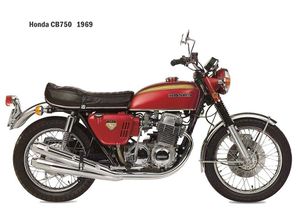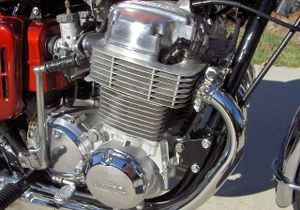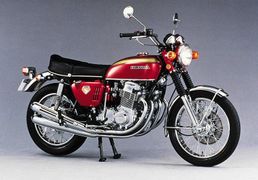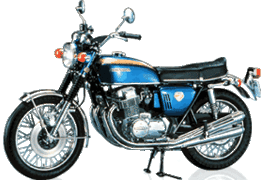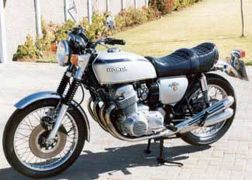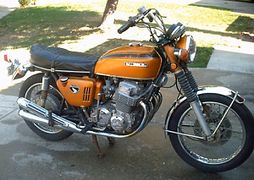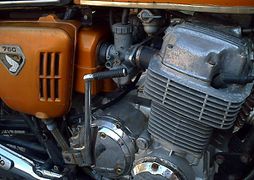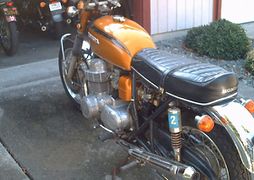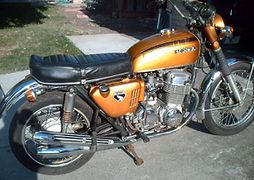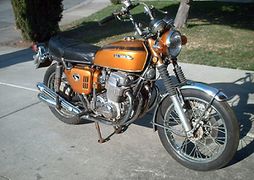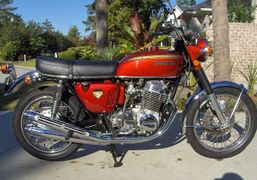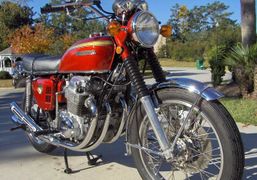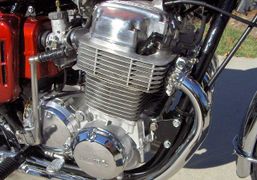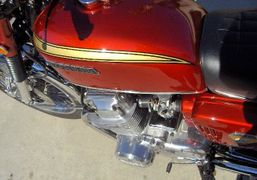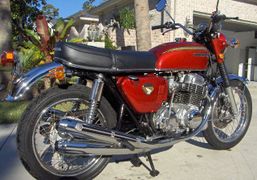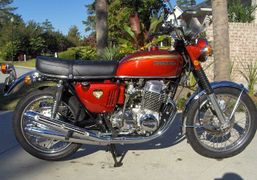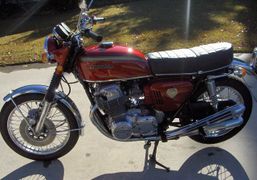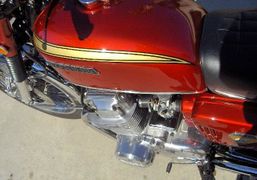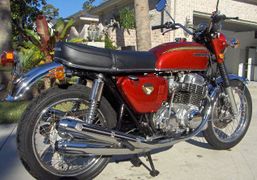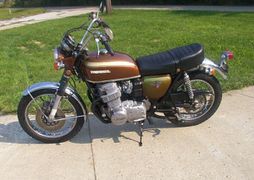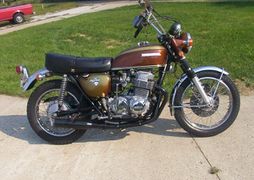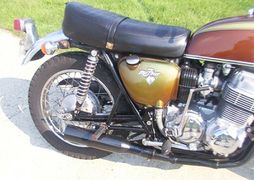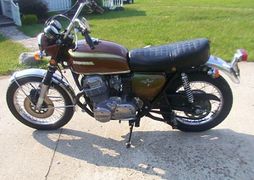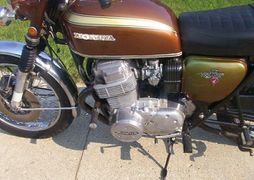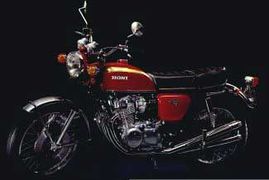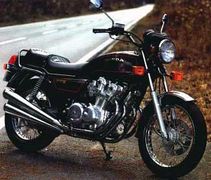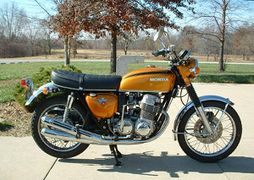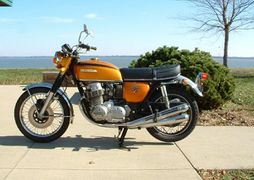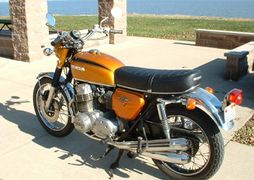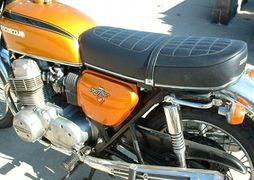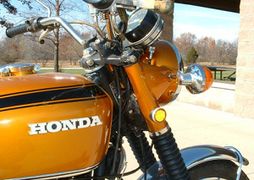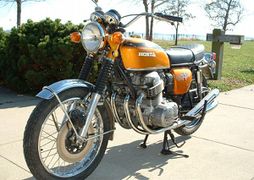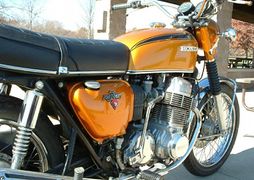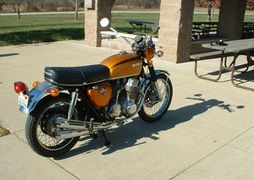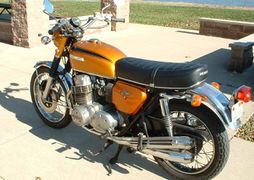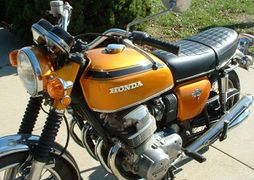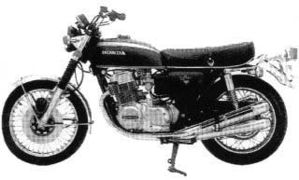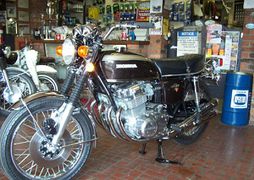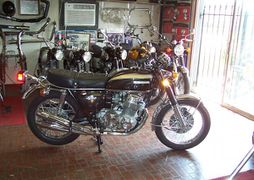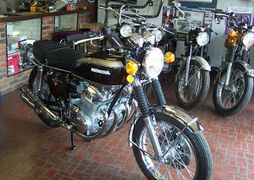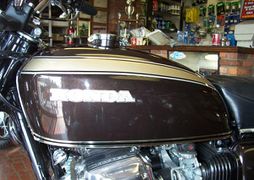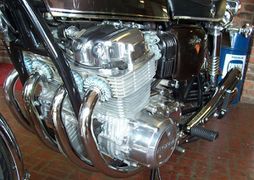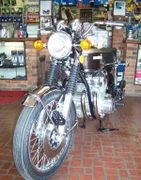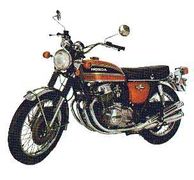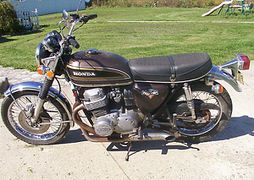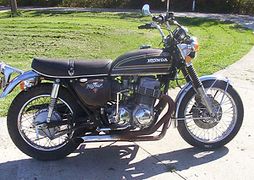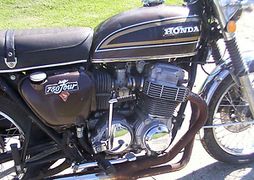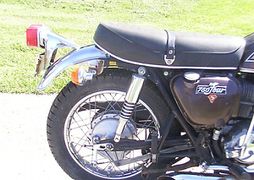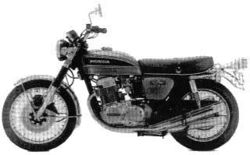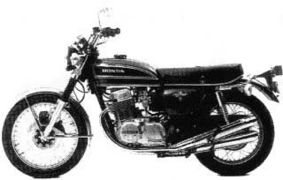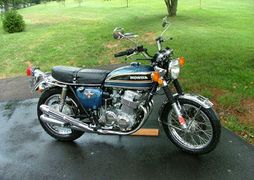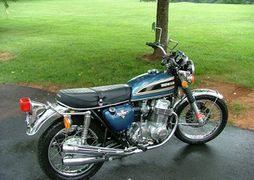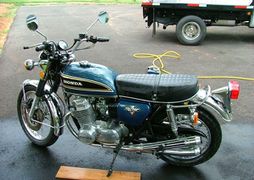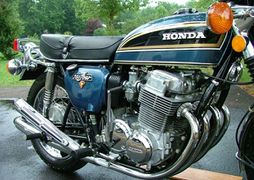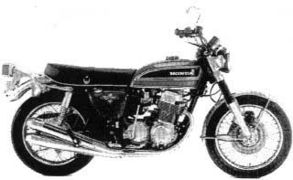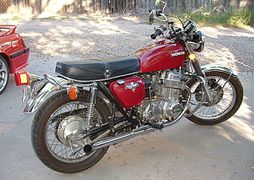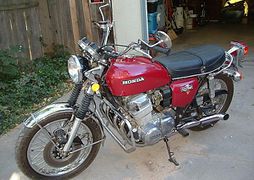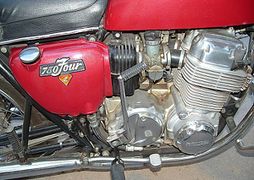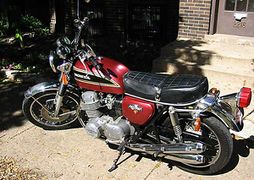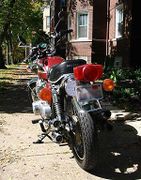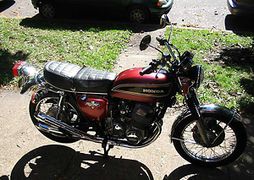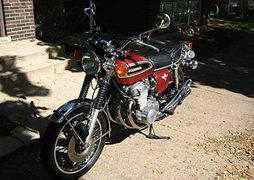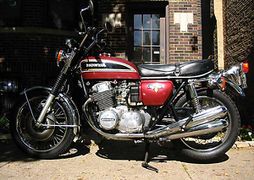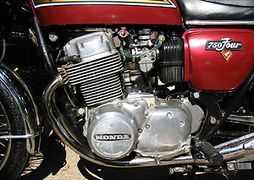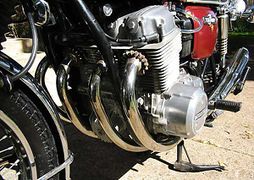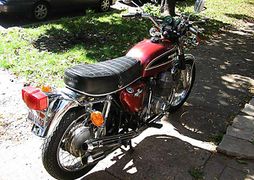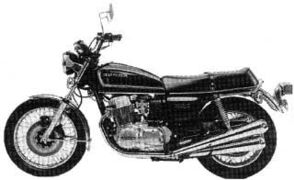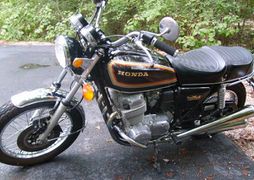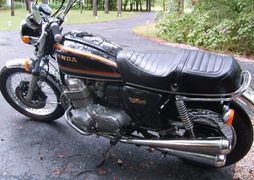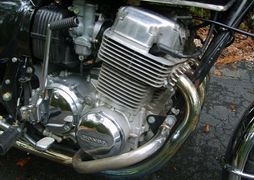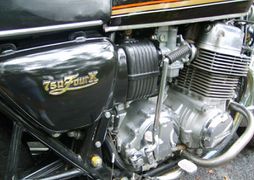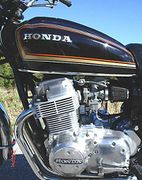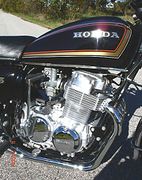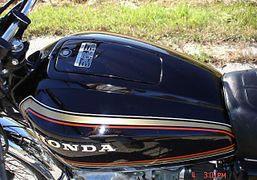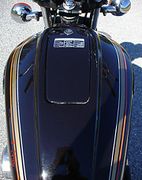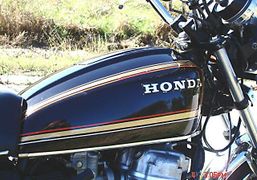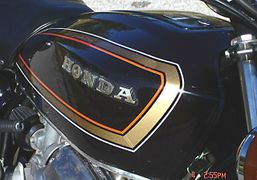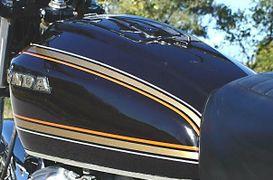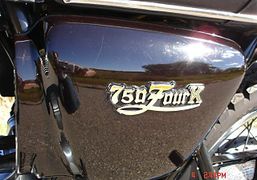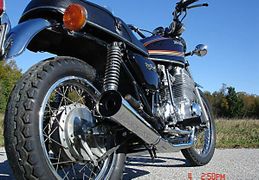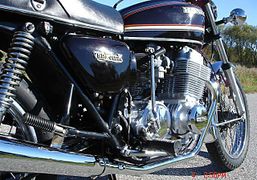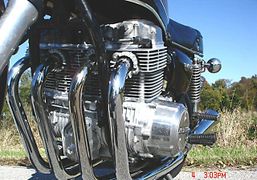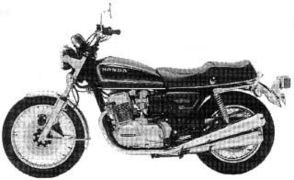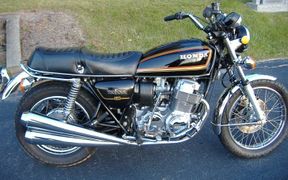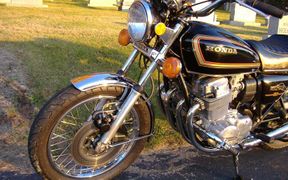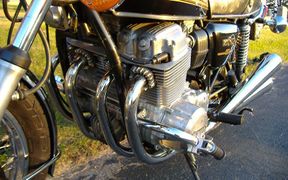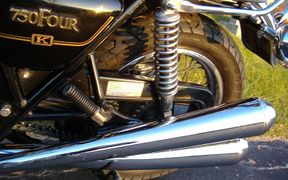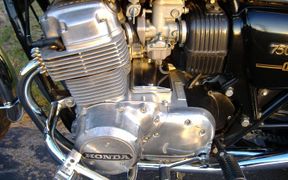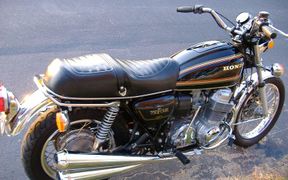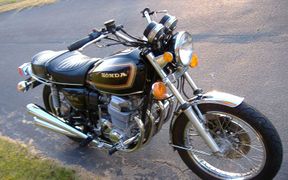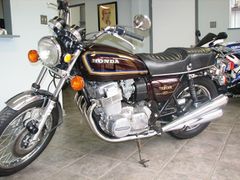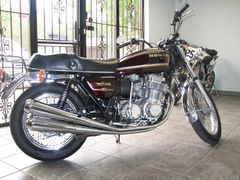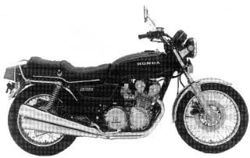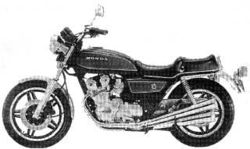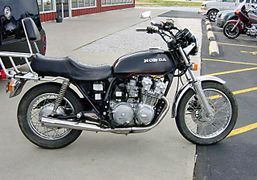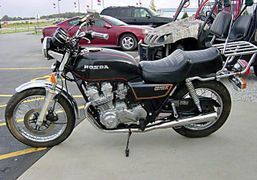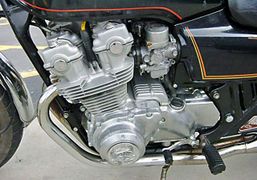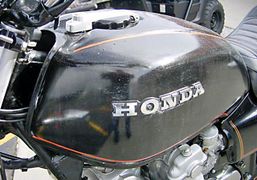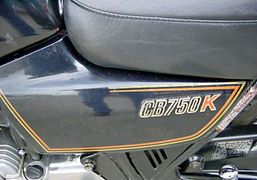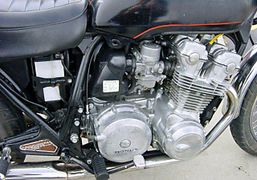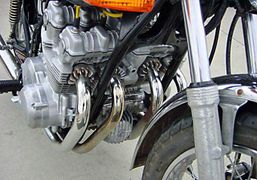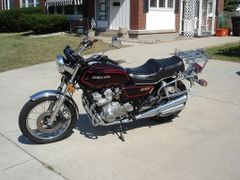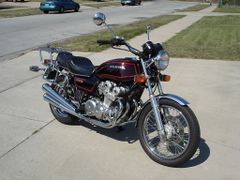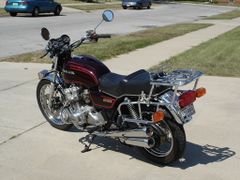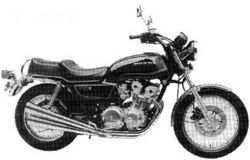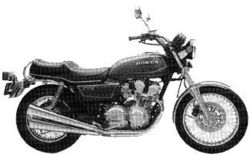Honda CB750K: review, history, specs
The Honda CB750K was a 736cc, four stroke, four cylinder, street motorcycle manufactured by Honda from 1968 through 1982. The model is included in the AMA Hall of Fame Classic Bikes,[1][2] the Discovery Channel's "Greatest Motorbikes Ever"[3]
History[edit | edit source]
In June of 1968, Honda dropped the gauntlet that would forever change the world of motorcycling. The CB750 "Four" offered a combination of features never before seen on a single motorcycle. No longer would Honda be known as scooter company.
At the heart of the CB750K was an inline four-cylinder engine with a single overhead cam, four carburetors, four-into-four exhaust pipes. It produced 67 horsepower at 8000 rpm which was 15-percent more power than BSA's new 750 cc Rocket 3 even though they weighed about the same (just under 227 kg (500 pounds)). The Honda, obviously, was much faster.
It was not just the four-cylinder engine that caused such a stir; though most contemporary competitors had twin cylinders, fours had been offered by several manufacturers in the past. Rather, it was the fact that the four-cylinder power and smoothness was joined by a five-speed transmission, electric starter, a front disc brake, and a nearly bullet proof design—the first ever on a street bike—all at a reasonable price.
The single cam version was produced without much refinement until 1978 when it was replaced with a long awaited, more modern, double cam model.
Honda also sold a race kit to convert the CB750 into a Honda CR750 race ready bike.
In 1975 Honda introduced the "F" or "SuperSport" model which had a rear disc brake and a 4 into 1 header as well as some other cafe inspired additions. The same year they also introduced the "A" or "HondaMatic" model which was a clutchless 2-speed model with a wet sump lubrication system.
Honda also produced smaller fours in 350,400,500,550 and 650 displacements.
Earlier CB750s were produced with sand-cast cases that had a rough finish, later models had smoother castings. Those early sand-cast models have become the most valuable to collectors.
By 1970, Dick Mann piloted a race-prepped CB750 into the winner's circle at the Daytona 200 and the world of spurring aftermarket upgrades to the CB750. The CB750 is also credited with casting the mold for what would later be called the "Universal Japanese motorycle", a breed of machines that would bring the Motorcycle manufacturers of England to their collective knees.
Under development for one year, when finally introduced to the market, The CB750 offered two unprecedented features: its disc brake and its inline four cylinder engine -- neither of which were previously available on mainstream, affordable, production bikes. These two features, along with the bike's introductory price of $1495.00 (US), gave the CB750 considerable advantage over its competition, particularly its British rivals.
Cycle Magazine called the CB750 "the most sophisticated production bike ever" upon its introduction. Cycle World called the motorcycle a masterpiece, highlighting Honda's painstaking durability testing, the bike's 120mph top speed, the fade-free performance of the braking, the comfortable ride, and excellent instrumentation .
As the first modern four cylinder machine from a mainstream manufacturer, the term Superbike was coined to describe the CB750. The bike offered other important features, both great and small that added to its compelling value: electric starter, kill switch, dual mirrors, flashing turn signals, screw on oil filter, maintenance free valves and overall smoothness and freedom from vibration both underway and at a standstill. On the other hand, the bike was difficult to get on its center stand and tended to throw chain oil on its muffler.
Unable to accurately gauge demand for the new bike, Honda limited its initial investment in the production dies for the CB750 by originally using a technique called permanent mold casting (often erroneously referred to as sand casting) rather than die-casting for the engines -- unsure of the bike's reception. The bike remained in the Honda lineup for ten years, sales totaling over 400,000 copies in its life span
The CB750 is sometimes referred to as a Universal Japanese Motorcycle or UJM, although certainly the bike has earned notoriety of its own. The Discovery Channel ranked the Honda CB750 among the top ten greatest motorbikes of all time, giving the CB750 third place.
Models - SOHC
The single overhead cam models were produced from 1969 through 1978.
- 1969 CB750K or CB750K0
- 1971 CB750K1
- 1972 CB750K2
- 1973 CB750K3 (US-only, K2 elsewhere)
- 1974 CB750K4 (US/Japan-only, K2 elsewhere)
- 1975 CB750K5 (US-only, K2/K4 elsewhere), CB750F
- 1976 CB750K6, CB750F1, CB750A
- 1977 CB750K7, CB750F2, CB750A1
- 1978 CB750K8 (US-only), CB750F3, CB750A2
DOHC
- 1979-1982 CB750K
- 1979 CB750L 10th Anniversary Edition
- 1979-1981 CB750F
- 1982 CB750SC Nighthawk
- 1991-2003 CB750 Nighthawk
In 2007, Honda Japan announced the sale of a new CB 750 very similar to the models sold in the 1970s. Announced were the CB 750 Special Edition (list price 798,000 yen) which is in the silver colors of the CB 750 AMA racer of the 1970s, and the CB 750 (list price 730,000 yen) in 3 color schemes reminiscent of CB 750s sold previously. As of August 2007, these bikes have only been announced for the Japan domestic market.
SOHC Versions[edit | edit source]
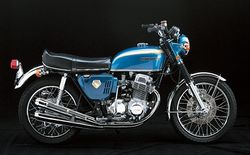 |
|
| Honda CB750K | |
| Manufacturer | |
|---|---|
| Production | 1969 - 1978 |
| Class | Standard |
| Engine | |
| Compression ratio | 9.2:1 |
| Top Speed | 124 mph [4] |
| Horsepower | 69.06 HP (51.5 KW) @ 8000RPM |
| Fuel System | 4x28mm Keihin carburetors |
| Spark Plug | NGK D8EA '69-78[5] |
| Battery | YUASA 12N14-3A '69-78[5] |
| Transmission | Gear box: 5 Speed Final Drive: Chain |
| Frame | Tubular steel duplex cradle |
| Suspension | Front: Telescopic fork Rear: Swing arm |
| Brakes | Front: Single disc Rear: Drum |
| Front Tire | 3.25-19 '69-76 3.50-19 '77-78[5] |
| Rear Tire | 4.00-18 '69-76 4.50-17 '77-78[5] |
| Wheelbase | 1453 mm / 57.2 in. |
| Seat Height | 810 mm / 31.9 in. |
| Weight | 517 lbs [6] (dry), 235.0 kg (wet) |
| Oil Capacity | 3.5 L / 3.7 US quarts |
| Oil Filter | K&N KN-401[7] |
| Recommended Oil | Honda GN4 10W-40 |
| Fuel Capacity | 17 L / 4.5 US gal |
| Related | Honda CB750F |
| Competition | Kawasaki H2 Kawasaki Z1 Yamaha XS750 Triumph Trident Suzuki GT750 BSA Rocket 3 |
| Manuals | Service Manual |
1969 to 1970[edit | edit source]
The CB750K0 Four was sold from 1969 to 1970 and was available in one of three colors: Candy Blue Green, Candy Gold, or Candy Ruby Red. The tank, side covers, and upper forks were of the basic color (green, gold, or red). The headlight shell was also the basic color. The bike had a 4-into-4 throttle cable system. The exhaust system was a 4-into-4. The engine was a 736cc SOHC 2-valve dry sump inline 4 cylinder linked to a 5-speed transmission and chain drive.
- Serial Number
- Frame: CB750-1000001
- Engine: CB750E-1000001
1970 to 1971[edit | edit source]
The CB750K1 Four was sold from 1970-71 and was available in one of four colors: Candy Ruby Red, Candy Gold, Valley Green Metallic, or Candy Garnet Brown. The gas tank stripe was gold. The tank, side covers, and upper forks were of the basic color (red, gold, green, or brown). The side covers were smaller and there were no slots on the leading edge. There was a two-throttle cable system (pull open and pull closed). The headlight shell was also the basic color. The exhaust system was a 4-into-4. The engine was a 736cc SOHC 2-valve dry sump inline 4 cylinder linked to a 5-speed transmission and chain drive. Honda CB750K1 Wiring diagram
- Serial Number
- Frame: CB750-1044650
- Engine: CB750E-1044806
1972[edit | edit source]
The CB750K2 Four was sold in 1972 and was available in one of three colors: Brier Brown Metallic, Flake sunrise Orange, or Candy Gold. The gas tank stripe was gold but as with previous models, the Gold tanks had a black stripe. The side covers were smaller than the K0 model and there were no slots on the leading edge. The upper forks were chrome. The headlight shell was black. The taillight and side reflectors were larger. There was a two-throttle cable system (pull open and pull closed). The exhaust system was a 4-into-4. The engine was a 736cc SOHC 2-valve dry sump inline 4 cylinder linked to a 5-speed transmission and chain drive.
- Serial Number
- Frame: CB750-2000001
- Engine: CB750E-2000001
1973[edit | edit source]
The CB750K3 Four was sold in 1973 and was available in one of three colors: Flake Sunrise Orange, Candy Bucchus Olive, or Maxim Brown Metallic. The gas tank stripes were white, gold and black. The side covers were smaller than the K0 model and there were no slots on the leading edge. The upper forks were chrome. The headlight shell was black. The taillight and side reflectors were larger than the K1 model. There was a two-throttle cable system (pull open and pull closed). The exhaust system was a 4-into-4. The engine was a 736cc SOHC 2-valve dry sump inline 4 cylinder linked to a 5-speed transmission and chain drive.
- Serial Number
- Frame: CB750-2200001
- Engine: CB750E-2200001
1974[edit | edit source]
The CB750K4 Four was sold in 1974 and was available in one of three colors: Flake Sunrise Orange, Freedom Green Metallic, or Boss Maroon Metallic. The gas tank stripes were white, gold and black. The side covers were smaller than the K0 model and there were no slots on the leading edge. The speedometer showed increments of 20 (i.e., 20, 40, 60, 80, etc.). The upper forks were chrome. The white tank pinstripe was wider than the K3 model. The headlight shell was black. The taillight and side reflectors were larger than the K1 model. There was a two-throttle cable system (pull open and pull closed). The exhaust system was a 4-into-4. The engine was a 736cc SOHC 2-valve dry sump inline 4 cylinder linked to a 5-speed transmission and chain drive.
- Serial Number
- Frame: CB750-2300001
- Engine: CB750E-2300001
1975[edit | edit source]
The CB750K5 Four was sold in 1975 and was available in one of two colors: Planet Blue Metallic or Flake Apricot Red. The instrument faces were dark green. The speedometer numbers were increments of 10 (i.e., 10, 20, 30, 40, etc.). The side covers were smaller than the K0 model and there were no slots on the leading edge. The upper forks were chrome. The white tank pinstripe was wider than the K3 model. The headlight shell was black. The taillight and side reflectors were larger than the K1 model. There was a two-throttle cable system (pull open and pull closed). The exhaust system was a 4-into-4. The engine was a 736cc SOHC 2-valve dry sump inline 4 cylinder linked to a 5-speed transmission and chain drive.
- Serial Number
- Frame: CB750-2500001
- Engine: CB750E-2372115
1976[edit | edit source]
The CB750K'76 Four was sold in 1976 and was available in one color: Candy Antares Red. The instrument faces were light green. The side covers were smaller than the K0 model and there were no slots on the leading edge. The upper forks were chrome. The white tank pinstripe was wider than the K3 model. The headlight shell was black. The taillight and side reflectors were larger than the K1 model. There was a two-throttle cable system (pull open and pull closed). The exhaust system was a 4-into-4. The engine was a 736cc SOHC 2-valve dry sump inline 4 cylinder linked to a 5-speed transmission and chain drive.
- Serial Number
- Frame: CB750-2540001
- Engine: CB750E-2428762
1977[edit | edit source]
The CB750K'77 Four K was sold in 1977 and was available in one of two colors: Candy Alpha Red or Excel Black. The gas tank stripe was gold with a white and red pinstripe. The "750 FOUR K" side cover emblem was gold. There was a two-throttle cable system (pull open and pull closed). The exhaust system was a 4-into-4. The engine was a 736cc SOHC 2-valve dry sump inline 4 cylinder linked to a 5-speed transmission and chain drive.
- Serial Number
- Frame: CB750-2700009
- Engine: CB750E-2700001
1978[edit | edit source]
The CB750K'78 Four K was sold in 1978 and was available in one of two colors: Purple or Excel Black. The gas tank stripe was gold with a gold and red pinstripe. The "750 FOUR" side cover emblem was a graphic design. There was a "K" side cover decal and stripe. The seat is contoured in a two-stage design. There was a two-throttle cable system (pull open and pull closed). The exhaust system was a 4-into-4. A locking lid covered the gas cap. The exhaust pipes (HM405) were without the black trim covers. The engine was a 736cc SOHC 2-valve dry sump inline 4 cylinder linked to a 5-speed transmission and chain drive.
- Serial Number
- Frame: CB750-2800001
- Engine: CB750E-3000001
DOHC Versions[edit | edit source]
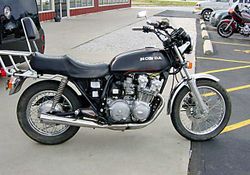 |
|
| Honda CB750K | |
| Manufacturer | |
|---|---|
| Production | 1979 - 1982 |
| Class | Standard |
| Engine | 749cc DOHC 4-valve inline four cylinder |
| Bore / Stroke | 62.0mm x 62.0 mm [8] |
| Top Speed | 124 mph [9] |
| Spark Plug | NGK D8EA '69-82 |
| Battery | YUASA YB14L-A2 '79-82 |
| Transmission | 5 Speed |
| Front Tire | 3.50-19 '79-82 |
| Rear Tire | 4.25-18 '79 4.50-17 80-82 |
| Wheelbase | 1520mm (59.81 in)[8] |
| Length | 2220mm (87.4 in)[8] |
| Width | 880mm (34.6 in)[8] |
| Height | 1160mm (45.7 in)[8] |
| Weight | 512 lbs[8] (dry), |
| Oil Capacity | 4.5 L (4.7 US qt) (when disassembled)[8] |
| Oil Filter | K&N KN-401[7] |
| Recommended Oil | Honda GN4 10W-40 |
| Fuel Capacity | 20 L (5.3 US gal) [8] |
| Related | Honda CB750F |
| Competition | Kawasaki H2 Kawasaki Z1 Yamaha XS750 Triumph Trident Suzuki GT750 BSA Rocket 3 |
| Manuals | File:Honda CB750K 1979 Owners Manual.pdf More Manuals |
1979[edit | edit source]
The CB750K'79 Four K was sold in 1979 and was available in one of three colors: Candy Muse Red, Candy Bayard Brown, or Black. The taillight lens was a wraparound unit with a painted cowling. The exhaust system was a 4-into-4. The speedometer had a 150 mph (240 kph) limit. The engine was a 749cc DOHC 4-valve inline four cylinder linked to a 5-speed transmission.
- Serial Number
- Frame: RC01-2000001
- Engine: RC01E-2000001
Limited[edit | edit source]
The CB750K'79 Limited Edition was sold in 1979 and was available in one color scheme: Candy Muse Red with Red. The gas tank and side covers were 2-tone. The wheels were black comstar. There was a separate taillight assembly with the 1978 style lens. The "10th ANNIVERSARY CB750K" side cover emblem was gold and green. The engine was a 749cc DOHC 4-valve inline four cylinder linked to a 5-speed transmission.
- Serial Number
- Frame: RC01-3000006
- Engine: RC01E-3000001
1980[edit | edit source]
The CB750K'80 Four K was sold in 1980 and was available in one of two colors: Candy Muse Red or Excel Black. There was a separate taillight assembly with a chrome bracket. The speedometer had a 85 mph (135 kph) limit. The engine was a 749cc DOHC 4-valve inline four cylinder linked to a 5-speed transmission.
- Serial Number
- Frame: RC01-2100005
- Engine: RC01E-2100005
1981[edit | edit source]
The CB750K'81 Four K was sold in 1981 and was available in one of two colors: Candy Muse Red or Cosmo Black Metallic. The speedometer had a 85 mph (135 kph) limit. The 4-into-4 mufflers had a new megaphone design. The front forks were air-adjustable. The engine was a 749cc DOHC 4-valve inline four cylinder linked to a 5-speed transmission.
- Serial Number
- Frame: JH2RC010*BM200001
- Engine: RC01E-2200020
1981 Honda Motorcycle Full-Line Brochure
1982[edit | edit source]
The CB750K'82 Four K was sold in 1982 and was available in one color: Candy Imperial Blue. The speedometer had a 85 mph (135 kph) limit. The front forks were air-adjustable. The front disc brakes were slotted with twin piston calipers. The 4-into-4 mufflers had a megaphone design. The engine was a 749cc DOHC 4-valve inline four cylinder linked to a 5-speed transmission.
- Serial Number
- Frame: JH2RC010*CM300003
- Engine: RC01E-2300003
See Also[edit | edit source]
In Media[edit | edit source]
- Spökligan
- Min misunnelige frisør
- Dias Melhores Virão
- Troppo forte
- Inspektor Kuper
- Balko
- Cazadores de hombres
- Persecuted
- The Walking Dead
- Stalked by My Neighbor
- The Jackal
- Kickboxer 5
- Ta tsakalia: Ena koinoniko provlima
- NYPD Blue
- Final Days of Planet Earth
- Lone Hero
- En plein coeur
- Les sous-doués
- Die Wilden Kerle 6 - Die Legende lebt
- Scorpion
- Hanna D. - La ragazza del Vondel Park
- In viaggio con papà
- Maman a tort
- Zabranjena ljubav
- Eddy Grant: Electric Avenue
- Alarm für Cobra 11 - Die Autobahnpolizei
- Bari Bari Densetsu
- Muzhchina dlya molodoy zhenshchiny
- Ljubica
- Bobby Barbers: Parak
- Yuen fan
- Ikidomari no Banka: Brake out
- Stop-Loss
- Homicide
- Matlock Police
- Scobie Malone
- McCloud
- I guappi non si toccano
- Esupai
- The Airborne Toxic Event: Changing
- Hell High
- Poliziotto sprint
- 1990: I guerrieri del Bronx
Videos[edit | edit source]
References[edit | edit source]
- ↑ Motorcycle Hall of Fame, 1969 Honda CB750; The Year of the Super-bike, American Motorcyclist Association, http://www.motorcyclemuseum.org/classics/bike.asp?id=91
- ↑ "The Dawn of the Superbike: Honda's Remarkable CB750", AMA Motorcycle Hall of Fame (American Motorcyclist Association), http://www.motorcyclemuseum.org/exhibits/superbikes/CB750/CB750.asp, retrieved 2010-02-20
- ↑ Greatest Motorbikes Ever. Discovery Channel.
- ↑ http://www.cyclechaos.com/wiki/File:Pg%2B9.jpg
- ↑ 5.0 5.1 5.2 5.3 2019 Western Power Sports Catalog. Western Power Sports. 2019.
- ↑ http://www.cyclechaos.com/wiki/File:Pg%2B9.jpg
- ↑ 7.0 7.1 2019 K&L Supply Co Catalog. K&L Supply Co. 2019.
- ↑ 8.0 8.1 8.2 8.3 8.4 8.5 8.6 8.7 1979 Honda CB750K Owners Manual. Honda. 1979. https://www.cyclechaos.com/wiki/File:Honda_CB750K_1979_Owners_Manual.pdf.
- ↑ http://www.cyclechaos.com/wiki/File:Pg%2B9.jpg
| ||||||||||||||
- Standard motorcycles
- Honda motorcycles
- 1970s motorcycles
- 1980s motorcycles
- Street motorcycles
- 750cc displacement motorcycles
- 750cc 4-stroke motorcycles
- 750cc Four cylinder motorcycles
- 4-stroke motorcycles
- Four cylinder motorcycles
- Four cylinder 4-stroke motorcycles
- DOHC motorcycles
- Honda CB series
- Sport touring motorcycles
- 1960s motorcycles
